
New Building, New Home 2026
To address the critical housing, health, and social justice needs of our community, we are partnering with Lu’ma Native Housing Society to redevelop our site at 320 East Hastings. The four-storey FIRST UNITED facility will serve as the pedestal for an additional seven stories of below-market rental housing for Indigenous Peoples (over 100 studio and one-bedroom units) which will be operated by Lu’ma. We are leasing two air space parcels to Lu’ma to support the housing development.
The new FIRST UNITED will offer close to 40,000 square feet of purpose-built program space, nearly triple that of our existing facility.
Latest news
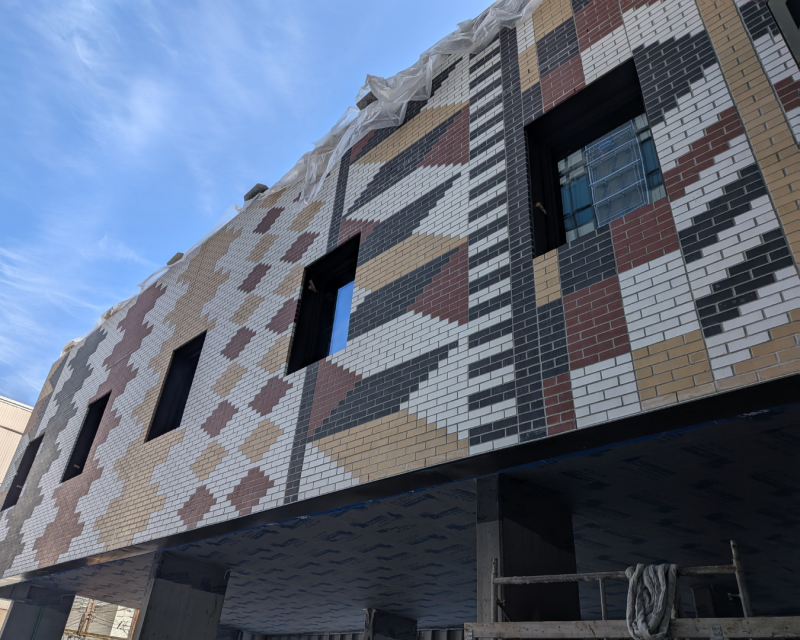
Redevelopment and Musqueam, Squamish, and Tsleil-Waututh Artwork
Date 29 Jul, 2025
Category Art Campaign, Blog, First Forward, Redevelopment
Our new building is starting to come alive—construction is progressing smoothly and the exterior artistic elements are beginning to take shape. Public art shares culture, stories, and narratives about a place. It creates a sense of purpose, identity, and pride. Who is included and who is excluded from these public narratives matters—and that’s why we’re […]

FIRST UNITED Statement: Supportive Housing Motion Passes
Date 27 Feb, 2025
Category Blog, First Forward, Redevelopment
Yesterday, Vancouver City Council voted to pass the motion to pause net-new supportive housing projects within Vancouver. After listening to over 80 speakers, including the FIRST UNITED Executive Director and Board Chair, overwhelmingly voice their opposition, Council chose to move forward with a damaging motion that will exacerbate homelessness and the affordable housing crisis and […]
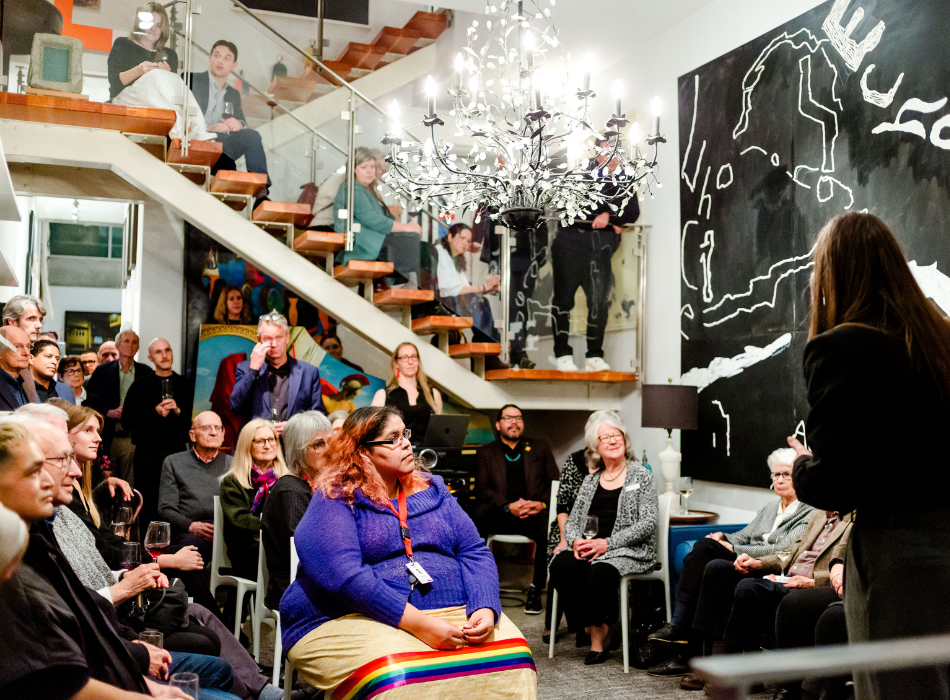
FIRST UNITED’s Downtown Eastside Redevelopment Project Launches New Art Initiative and Confirms $1 Million in Support from Audain Foundation
Date 15 Nov, 2024
Category First Forward, Redevelopment
FIRST UNITED formally launches a new art initiative as part of its First Forward capital campaign at a reception hosted by Bruce Wright. Photo by Maxine Bulloch. xʷməθkʷəy̓əm (Musqueam), Sḵwx̱wú7mesh Úxwumixw (Squamish) and səlilwətaɬ (Tsleil-Waututh) territory/Vancouver, B.C. – Construction of the FIRST UNITED redevelopment project at 320 East Hastings in the Downtown Eastside is approximately […]
Committed to Community
Our building may be changing, but our services are not! During the construction, all of our responsive, low-barrier programs have been relocated to nearby satellite locations so that we can continue to support our neighbours in the Downtown Eastside (DTES). The emergency shelter will continue to operate offsite moving forward.
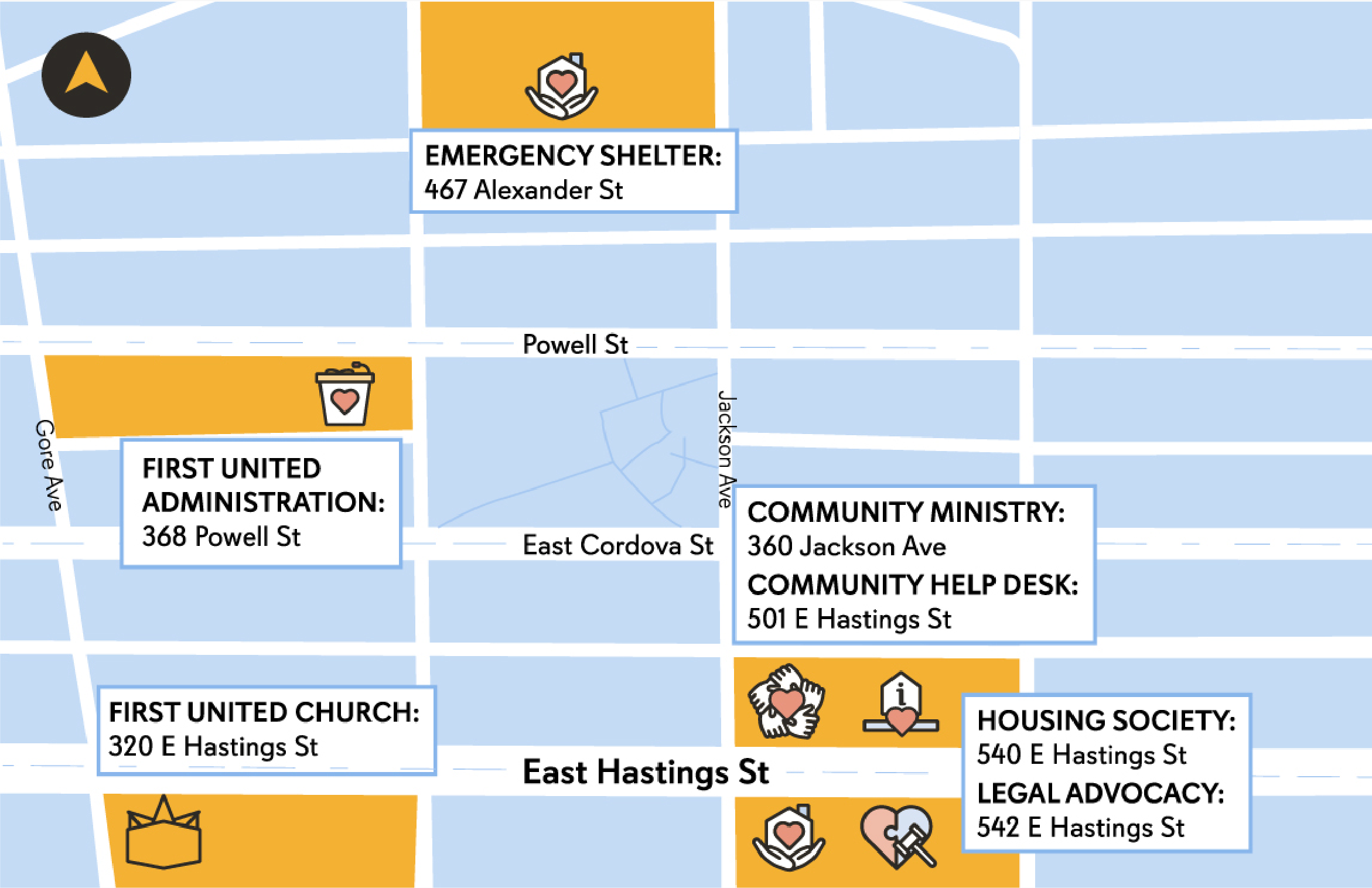

Food First
Wondering about our meal program? It’s going mobile! The FIRST UNITED meal program will continue to deliver 100,000+ meals per year to our community via the Food First food truck. The food truck has a roaming permit and sets up across the street from our site at Hasting and Gore, serving 250+ lunchtime meals a day Monday to Friday. Learn more
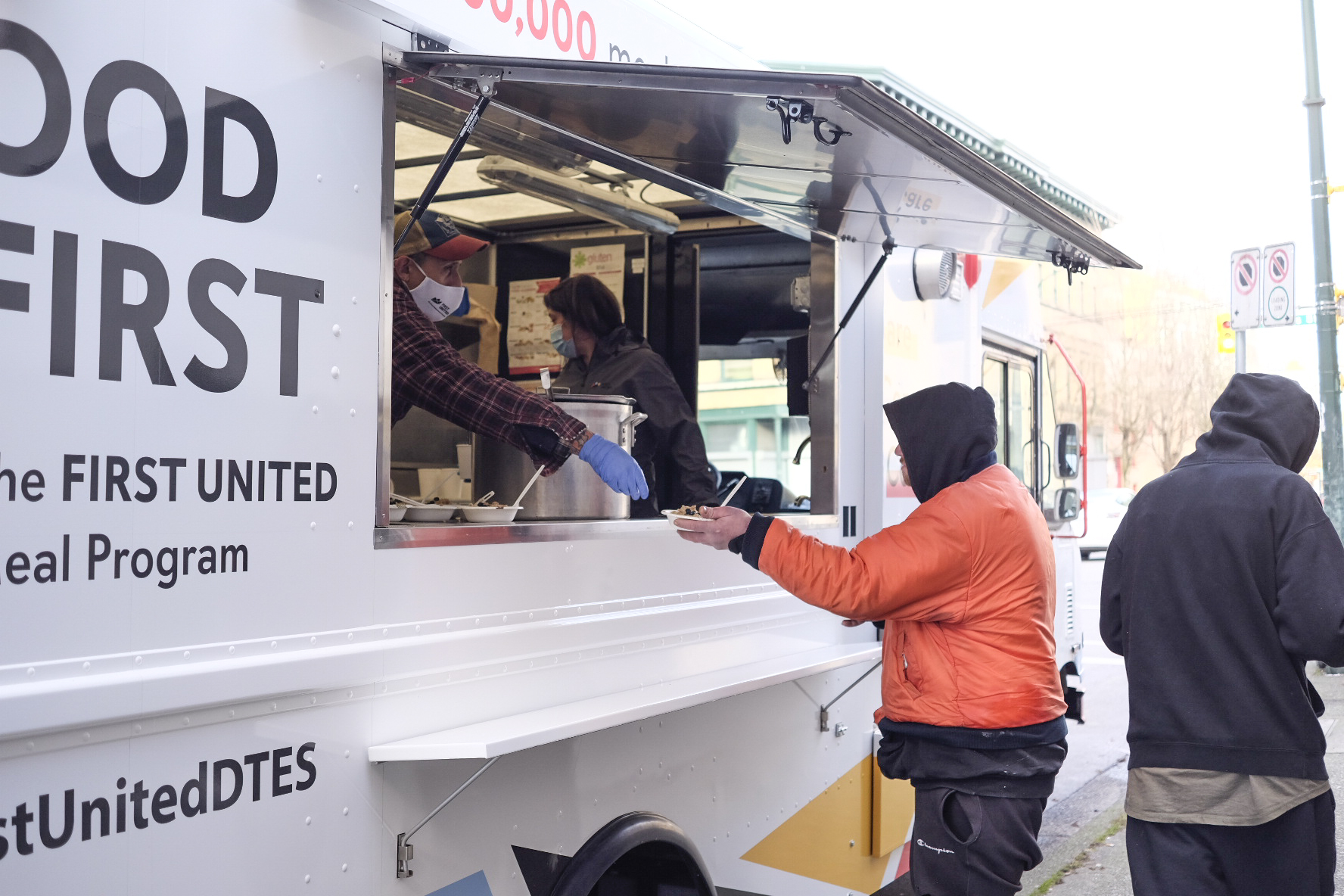
We Listened
In 2017 we undertook an extensive feasibility study, speaking with FIRST UNITED community members, DTES residents, and other DTES service providers to better understand the needs of our community and then incorporate those into the design of our new facility.
Our new building at 320 East Hastings will include:

Two Drop–in Spaces

Warming and Cooling Centre

Climate Crisis Response

Commercial Kitchen and Dining Room

Community Help Desk

Legal Advocacy Clinic

Women's Day Sleeping Room

Women's Drop-In Space

Public Showers

Computer Lab

Private Connection Spaces

Outdoor Deck

Multifaith Sacred Space

Collaborative Spaces

FIRST Administrative Offices

103 below-market housing units
Redevelopment Timeline
In 2017, we embarked on an ambitious redevelopment project. Here are some of the key milestones.

Learn more about the project
Redevelopment Advisors
Join us to move First Forward.
You can’t put a price on dignity. But you can help us build a space that embodies it.
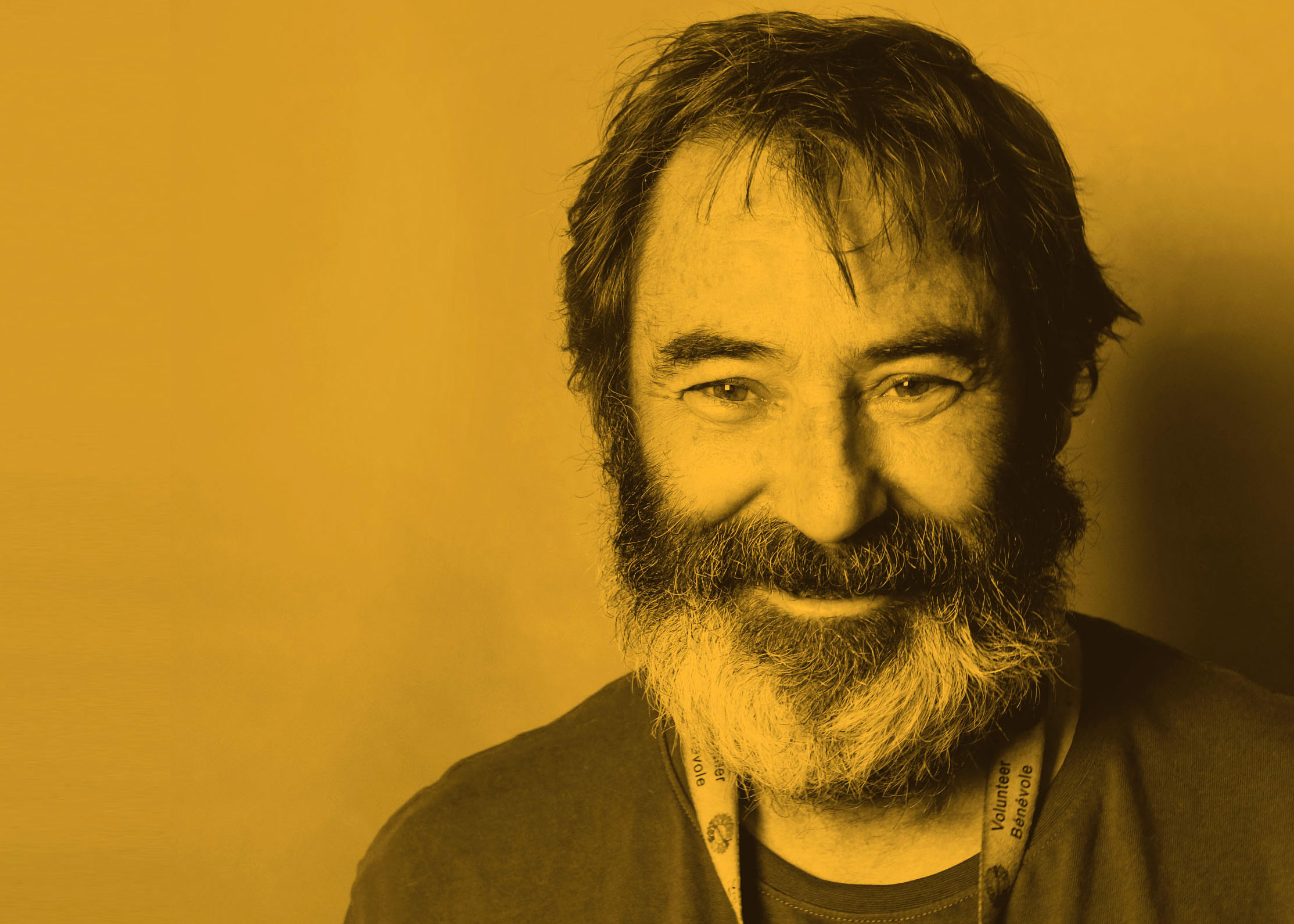
FAQ
General Questions
Who is FIRST UNITED?
FIRST UNITED Church Community Ministry Society (commonly known as FIRST UNITED) is an inner-city ministry of the United Church of Canada committed at its heart to the struggle for social justice, offering programs of advocacy, and healing in Vancouver’s Downtown Eastside (DTES). We have been operating in the DTES for over 130 years, offering a place to find sanctuary, connection, and care.
Are your services exclusive?
FIRST UNITED is a low-barrier service provider. Our services are accessible to low income, under-housed and homeless individuals living in Vancouver’s DTES, regardless of age, race, gender, ethnicity, ability, or faith. Our programs will continue to serve all demographics and community members’ in the Downtown Eastside. We believe that housing is a human right for everyone and will continue to advocate and support members in theDTES to fulfill our vision for a neighborhood where everyone’s worth is celebrated and all people thrive.
Why is redevelopment necessary?
We offer direct services to meet the immediate needs of our community, but in the face of the housing and homeless crisis, opioid crisis, and COVID-19, those needs have outgrown our facility at 320 E Hastings. Originally built as a church in 1965, the facility’s increasing maintenance needs present a drain on our resources and a further constraint on our ability to meet the urgent needs of our Downtown Eastside neighbours.
What is the overall plan for redevelopment?
We are partnering with Lu’ma Native Housing Society to redevelop our site into a multi-storey, purpose-built space that will offer four floors of community amenities, programs and services (administered by FIRST), as well as over 100 units of below-market rental housing for Indigenous Peoples (administered by Lu’ma). FIRST UNITED’s First Forward Campaign will raise the $37 million in funding needed to complete FIRST’s portion of the project.
What other companies and organizations are involved in the project?
We are thrilled to be working with a strong community of partners and advisors on this project. Our First Forward redevelopment project already has strong buy-in from municipal and provincial governments and agencies. Our Redevelopment Advisory Team includes some of the city’s top developers, community engagement specialists, and consultants, including representatives from Martha Burton Management Consulting, BJW Investments, NSDA Architects, Arcadis IBI Architects, Ideaspace, CitySpaces, Norton Rose Fulbright, and Manning Elliott. We are particularly grateful for the participation of Chief Ian Campbell, and for the insights of indigenous consultants Luugigyoo Dr Patrick Stewart and Cory Douglas.
How will you ensure you can deliver/complete the project?
FIRST UNITED has secured bridge funding which will enable our redevelopment project to proceed and be completed on schedule. Thanks to very low interest rates, we are able to welcome gifts in the form of multi-year donations, bequests and other planned giving over the coming years to support the project’s capital costs.
How long will it take to complete the project?
Demolition work began in June 2022 following the relocation of our emergency services to other locations in the DTES. Demolition will be complete in June 2023, with construction beginning in fall/winter 2023 and completing in fall/winter 2025.
How will the new building better serve FIRST’s mission?
We envision a neighbourhood where everyone’s worth is celebrated, and all people thrive. Regardless of circumstance, all people deserve the dignity and care that a safe, purpose-built space can provide. Our facility can, and should, reflect that vision. For decades we’ve found creative ways to provide vital services by adapting our facilities to serve the DTES. Imagine the level of care and connection we can offer in a space that is three times larger than that in which we currently operate, and that is purpose–built to our work and the needs of our community.
What will the entire project cost?
The total cost of the redevelopment of 320 E Hastings is approximately $91 million. FIRST UNITED’s portion of the project, comprising the first four floors of the building, will cost approximately $37 million.
Community Engagement Questions
What steps has FIRST UNITED taken to engage in consultation with relevant communities and stakeholders?
FIRST undertook numerous studies and community consultations to understand the needs of the community we serve and to gauge the level of public and government support for the project. These included:
• A Sensitive Listening Study with the DTES community conducted by CitySpaces in 2017
• A Redevelopment Feasibility Study conducted by CitySpaces in 2018
• A process of Community Engagement with the assistance of CitySpaces in 2019/2020
• Regulatory Engagement conducted by Ideaspace in 2020
• A Capital Campaign Feasibility Study performed by Waller & Associates in 2020
• A Community pop-up session (held outdoors) to present our Development Permit application to the community we serve in 2020
Thanks to this work, we are thrilled to say that this project received overwhelmingly positive feedback from our community when presented at the pop-up session and has also received unanimous support from the Urban Design Panel, Vancouver Heritage Commission and the Development Permitting Board.
How might the project support awareness and education efforts around reconciliation?
FIRST UNITED honours that we do our work on the unceded lands of the Musqueam, Squamish, and Tsleil– Waututh (MST) peoples. We solemnly acknowledge the interconnected histories of colonization and systemic racism that affect generations of indigenous people living in this territory and urban indigenous peoples from other territories, including members of the FIRST UNITED community. Our deep commitment to reconciliation has informed the planning, implementation, and design of our project in ways that we hope will inspire how others approach development and community projects in the future. We have:
• Performed extensive consultations with the FIRST UNITED community and added new services and spaces to address their needs
• Incorporated indigenous cultural elements into the design of the building in a culturally respectful and appropriate way informed by direct consultation and input from Luugigyoo Dr. Patrick Stewart, Nisga’a architect, and Xalek/Sekyu Siyam Chief Ian Campbell
• Ensured that the building’s dedicated Sacred Space and Outdoor Gathering Area are suitable and welcoming for traditional indigenous ceremonies
• Partnered with Lu’ma Native Housing Society to maximize the potential of our site and provide safe, secure, below-market housing for indigenous peoples
How are the needs and issues of FIRST community members being addressed in the redevelopment?
Based on extensive consultation with our DTES neighbours, this project is informed by the community for the community, and we are excited to build a space that provides the healing, connection, and care that our community needs. Among the issues identified by our community were the lack of safe outdoor spaces in which to congregate, socialize, sit, or rest during the hours in which SROs and shelters are closed. To address this, our new facility will include an outdoor rooftop where our community can safely gather, socialize, hold ceremonies, or simply sit with a cup of tea. We’ve also included new day sleeping facilities, where our community can rest, and private counselling spaces where they can go for private moments of respite or connection with FIRST ministry and program staff.
LU’MA Housing Questions
When housing is such a need in the DTES, why is FIRST UNITED only focusing on indigenous housing needs?
Nearly 40% of residents of the DTES identify as indigenous, as opposed to only 2-4% in the Greater Vancouver Area. Rebuilding a church was not possible without building housing (required by the City of Vancouver). As FIRST was committed to providing as much charitable housing (as opposed to just low-income/affordable) as possible and for the most vulnerable, the Board made a decision to align an organizational priority of reconciliation with building housing for urban indigenous peoples. Reconciliation is not only a strategic priority at FIRST and of the national United Church, it is also a Government priority, and as such FIRST is able to leverage various funding agreements to reduce the capital cost of providing affordable housing for urban indigenous peoples.
Why is Lu’ma the operator at 320 E Hastings?
Partnering with Lu’ma ensures the housing will be designed by indigenous members of the community with their needs in mind, and managed by an indigenous organization with a decades-long history of providing culturally safe housing that is culturally safe.
Will housing residents access the building through FIRST?
No. The main entrance for FIRST UNITED will be on the corner of East Hastings and Gore Avenue. FIRST UNITED will retain the 320 E Hastings address, while the residential component will become 438 Gore Avenue. The residential entrance will be on the southwest corner of Gore Avenue.
Will members of the FIRST community be eligible for housing in the Lu’ma units?
Eligible community members will be able to apply directly to Lu’ma and tenant selection will follow Lu’ma’s organizational processes and procedures in compliance with BC Housing affordable and supportive housing operating agreements. FIRST UNITED’s case managers will be able to make referrals but not guarantee housing to community members seeking other services at FIRST.
Will residents have access to FIRST services and programs?
Yes. All residents in Lu’ma housing will have access to programs at FIRST UNITED. Eligible residents will also have access to our tax clinic. Supportive housing residents will receive meals from FIRST UNITED as part of our partnership. We’re in the process of exploring other explicit partnership programs as we construct the building.
Program and Services Questions
Where will you ensure continuity of service during the construction phase?
Where will you ensure continuity of service during the construction phase?
Our current services will be relocated to satellite locations during the construction. The following sites have been confirmed:
• Community Ministry – 360 Jackson Avenue
• Community Help Desk – 501 E Hastings Street
• Legal Advocacy – 542 E Hastings Street
• Kitchen Services – 620 Clark Drive + food truck (see below)
• Administration – 368 Powell Street
Our emergency shelter will also be relocated to 467 Alexander Street and will continue to operate from that location moving forward.
Will there still be a shelter space in the new FIRST?
No. The Emergency Shelter will continue to operate off site moving forward. FIRST has made the conscious decision to focus on operating / enabling permanent housing rather than temporary shelter, as stability in housing has been clearly linked to greater stability and well-being for individuals.
This does not, however, change the fact that there is a need for temporary shelter in our community. Our current shelter will continue to operate from its new location at 467 Alexander Street, and over the next 3-5 years we will transition operation of the facility to BC Housing. Our new facility will also provide a dedicated day sleeping area, which will offer a safe place to sleep when shelters, SROs or other spaces are closed during the day.
How is the meal program going to be managed during the construction?
We are incredibly excited to be launching a new initiative that will enable us to serve hot, nutritious meals to our community in the DTES during the building redevelopment and beyond—the FIRST UNITED food truck program!
Our commissary kitchen has been temporarily relocated to Clark Drive. Meals will be prepared at this location and then distributed to DTES residents via our new mobile food truck fleet, which consists of a minivan, a cargo van, and a fully-equipped food truck. Our mobile fleet will ensure that the 200+ meals we currently serve each day continue to reach those in need. The food truck will also be used to help raise funds for our meal program as well as build awareness about the First Forward Capital Campaign and the work of FIRST UNITED.
What new services are being added once the new facility is open?
We’re thrilled to be offering several new services and facilities to the FIRST community including a new library and computer lab; dedicated space for day sleeping while shelters are closed; private counselling spaces; and a rooftop deck with a covered smoking area, Indigenous landscaping, and space for outdoor gatherings and ceremonies.
Building and Redevelopment Questions
Why not just renovate the existing building and expand services into other spaces in the surrounding area?
Our current building was constructed as a church in 1965 and was never meant to be used for the frontline work that now constitutes its primary function. For decades we’ve found creative ways to adapt our facility to serve the DTES, but as our building falls into disrepair it presents hazards for our community and constitutes a drain on vital financial resources. Problems include a leaking roof, boiler issues, heating issues, and ongoing structural maintenance. Renovating our existing building into functional spaces would be difficult, costly, and would not enable us to increase our available program space. The redevelopment further presents an opportunity for FIRST to maximize the potential of our site, address the homelessness crisis, and affirm our commitment to reconciliation by utilizing our available air space to enable the creation of 103 affordable housing units for indigenous peoples in the DTES.
Will anything from the building’s heritage be maintained?
While a church has been located at 320 East Hastings since 1892, the existing church was built in 1965. Though an iconic structure in the DTES, it is not on the Heritage Registry. To recognize the long history of First United, the Vancouver Heritage Foundation memorial plaque on the existing building will be integrated into the new structure.
Opportunities to re-use some of the existing stone tile cladding in the interior of the building are also being explored.
Why is the iconic roof of the FIRST UNITED building not being preserved or recreated?
Unfortunately, the roof isn’t consistent with today’s construction codes or guidelines. A flat roof is needed for elevators and mechanical/electrical systems. Constructing an angular roof would also take away an important outdoor rooftop amenity space for residential tenants. There are nods to the angular roof line in the new design, and our new building will be iconic and innovative in its own right.
What is the indigenous / ancestral history of the FIRST UNITED site?
The site of our building is part of an areas known by the Musqueam, Squamish and Tsleil-Waututh (MST) as K’emk’emelay, meaning “place of broadleaf maple trees.” It was once a rich and vibrant trading area which sustained indigenous peoples with an abundance of wildlife, marine life, forests, and marshlands.
How is the indigenous culture and history of the site being incorporated into the design?
We are extremely grateful for the guidance that Luugigyoo, Dr. Patrick Stewart, Nisga’a architect, and Xalek/ Sekyu Siyam Chief Ian Campbell have offered in the design of the new FIRST UNITED building, and we are proud to be incorporating the following:
• The sloping wall of FIRST UNITED on Gore Avenue will be a copper-coloured metal wall laid in a horizontal pattern alluding to the traditional plank houses of the Coast Salish. Copper is an important material to many northwestern Indigenous cultures, especially in the north and central regions of BC
• Two welcome figures carved by MST carvers will be placed at the main entrance to FIRST UNITED
• Vertical sunscreens on our western elevation will have custom fabricated panels featuring laser-cut indigenous images
• The entrance to the residential tower will have poured concrete detail with commissioned art by an MST artist
• Art installations by MST and urban indigenous artists will be commissioned for publicly accessible spaces
• The building colours have been chosen in consultation with our Indigenous consultants to reflect traditional colours used by the Musqueam, Squamish, and Tsleil–Waututh peoples
Will the new building be environmentally sustainable?
The United Church of Canada and FIRST UNITED are committed to being climate leaders. Beyond the building’s obvious contribution to cultural and social sustainability, the project has been designed to high environmental standards. This includes the integration of solar shading technology, a highly insulated building envelope and high efficiency mechanical and electrical systems to meet or exceed City of Vancouver requirements and the 2019 BC Housing Design Guidelines.
How will the new building support the expansion of FIRST services and program?
The new building will offer close to 40,000 square feet of program space, nearly triple that of our existing facility.
Many of the rooms and spaces are designed to be multi-functional, enabling us to adapt to the urgent needs of the community we serve.
What is the longevity of the building?
The expected life of the building is a minimum of 60 years.
What other revitalization efforts are taking place on the corner of Gore and Hastings?
Orange Hall on the northwest corner has been refurbished, and a new building was constructed on the southwest corner that is a combination of retail, shelter rate, and mixed secured rental housing. The site at 301 E Hastings on the northeast corner of Hastings and Gore is owned by Vancouver Coastal Health. They have been working on design development but are not scheduled to commence construction for 3-5 more years.
Governance Structure
Who owns the land at 320 East Hastings?
We do! The Pacific Mountain Regional Council of the United Church of Canada transferred the property at 320 E Hastings to the United Church Community Ministry Society last September.
Who will hold the mortgage?
FIRST UNITED will maintain ownership over the building and will possibly take a small 2-3-year mortgage on the title of the podium space while we complete receipt and processing of contributions to our capital campaign. We are awaiting final approval of a plan whereby the construction costs of 40% of the housing units will be paid by the three levels of government, and the remaining 60% of units will have mortgages held by Lu’ma Native Housing Society against a 60-year leasehold interest. Given the unanimous support we’ve received from all levels of government in each of our design and regulatory processes, we are confident that our plan will be approved.
Is FIRST UNITED selling its air space parcel to the housing provider?
No, we are not. We are leasing the housing component of the building in two air space parcels: one for the forty units of supportive housing and one for the remaining units. Both will be operated by Lu’ma, but they’re separated based on the type of government funding assigned to the units.
Feasibility Questions
What will the entire project cost?
The total cost of the redevelopment of 320 E Hastings is approximately $91 million. FIRST UNITED’s portion of the project, comprising the first four floors of the building, will cost approximately $37 million.
How will FIRST fund the redevelopment?
Our First Forward Capital Campaign is working to secure the funds needed through fundraising and grants.
Thanks to widespread enthusiasm for the project, over $27 million was secured by the end of December 2022, including a $10 million Leadership Gift and $2.5 million in corporate gifts.
What happens if FIRST does not meet its fundraising goal?
Based on the strong support expressed by our community as well as by municipal and provincial governments and other partners, we are confident that we will be able to meet our fundraising targets. With over $27 million already committed, FIRST UNITED has also secured bridge funding from BC Housing in order to guarantee our redevelopment and construction timeline. The goal of our First Forward Campaign is to raise the remaining funds by the time the building is complete in 2025; however, we will continue to pursue donations and grant funding beyond that point, as necessary, to ensure our funding requirements are met.
What happens if FIRST raises more funding than the project requires?
Any additional funds raised will support related capital costs, long-term maintenance and operational needs for the new building.
How will fundraising and events be conducted during COVID-19?
We are currently offering both in-person and virtual events and information sessions in order to respect the preferences and individual needs of donors and community members.
Contribution Questions
How can I help?
You can help us realize this amazing project by making a donation (of any size) to our First Forward Capital Campaign and by helping us spread the word. We accept one-time, monthly and multi-year cash gifts as well as planned giving in the form of corporate donations, matching gifts, charitable annuities, securities, and bequests.
If I can’t make a campaign gift now, can I make one at a later date?
Yes, absolutely. We will continue to accept donations towards the project through to the end of 2027. You can make a pledge now and specify a later payment date in your Donor Gift Agreement, or you can make a donation to FIRST UNITED at a future date. If your gift is realized before completion of the building, your contribution will go towards our fundraising goal. If your gift is realized after 2027, you may designate those funds towards either a) the longterm capital costs of the building, or b) the ongoing operational needs at FIRST UNITED.
Can I give different amounts in different years for my pledge payments?
Yes, you can. Based on the total amount of your pledged gift, the FIRST UNITED team will work with you to establish the number of installments, the size of each installment, and the schedule that works for you.
Once I make my campaign gift, how else can I help?
We would love for you to help us spread the word to anyone you know who might be interested in joining you to help us move First Forward. You can share information about the First Forward project by:
• Referring your contacts to the Redevelopment page of our website
• Sending an email introduction to [email protected]
• Sharing your enthusiasm for our project on social media and tagging us on Facebook, Twitter, and Instagram @FirstUnitedDTES using the hashtag #FirstForward
Why aren’t you naming spaces after donors?
To honour FIRST UNITED’s commitment to reconciliation, we are naming all spaces in the new building after the Indigenous and spiritual roots of the land that the building occupies and the Indigenous leaders who were part of the founding of Vancouver. We’re very excited to be one of the first organizations to implement this proactive, cutting-edge approach that puts reconciliation front and centre in the fundraising space.
How do dedications work?
Donors can dedicate donations of $10,000 or more to a specific area or space in the new building and FIRST UNITED will dedicate the space in the name of the donor, the donor’s family, the donor’s business, or as a memorial or tribute to another person, as determined by the donor and approved by FIRST UNITED’s Director of Development. FIRST UNITED is pleased to offer collective and sole dedication opportunities, with the latter available for gifts of $250,000 or more. Dedication will be reflected on a plaque beside the Indigenous name of the area or space for 10 years.
What happens to a dedication plaque after the 10-year timeline?
When we approach this milestone, the FIRST UNITED team will get in touch with you and your family to give you the first right of renewal on your dedicated space.